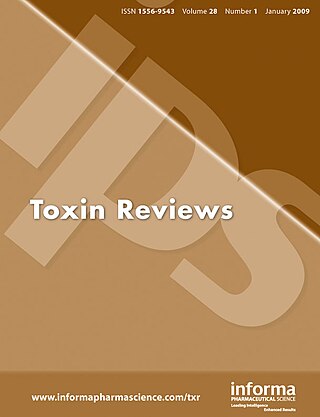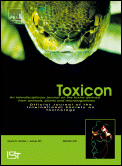
Pharmacology is the science of drugs and medications, including a substance's origin, composition, pharmacokinetics, pharmacodynamics, therapeutic use, and toxicology. More specifically, it is the study of the interactions that occur between a living organism and chemicals that affect normal or abnormal biochemical function. If substances have medicinal properties, they are considered pharmaceuticals.

Xenobiotica is a peer-reviewed medical journal that publishes comprehensive research papers on all areas of xenobiotics. It is published by Informa plc and covers six main areas:

IIT Research Institute (IITRI), also known historically and interchangeably as IIT Research Center, is a high-technology scientific research organization and applied research laboratory located in Chicago, Illinois. Previously known as the Armour Research Foundation, the IITRI is an independent corporation that operates collaboratively with the Illinois Institute of Technology (IIT) and the U.S. Government.

Phytotherapy Research is a monthly peer-reviewed scientific journal publishing original research papers, short communications, reviews, and letters on medicinal plant research. Key areas of interest are pharmacology, toxicology, and the clinical applications of herbs and natural products in medicine, from case histories to full clinical trials, including studies of herb-drug interactions and other aspects of the safety of herbal medicines. Papers concerned with the effects of common food ingredients and standardised plant extracts, including commercial products, are particularly relevant, as are mechanistic studies on isolated natural products.

The Annual Review of Pharmacology and Toxicology is a peer-reviewed academic journal that publishes review articles about pharmacology and toxicology. It was first published in 1961 as the Annual Review of Pharmacology, changing its name in 1976 to the present title. As of 2023, Annual Review of Pharmacology and Toxicology is being published as open access, under the Subscribe to Open model. As of 2023, Journal Citation Reports lists the journal's 2022 impact factor as 12.5, ranking it first of 94 journal titles in the category "Toxicology" and ninth of 277 titles in the category "Pharmacology & Pharmacy".

Nature Reviews Drug Discovery is a monthly peer-reviewed review journal published by Nature Portfolio. It was established in 2002 and covers drug discovery and development. The editor-in-chief is Peter Kirkpatrick. According to the Journal Citation Reports, the journal has a 2021 impact factor of 112.288, ranking it 1st out of 158 journals in the category "Biotechnology & Applied Microbiology" and 1st out of 279 journals in the category "Pharmacology & Pharmacy".

Toxin Reviews is a quarterly peer-reviewed medical journal covering research on multidisciplinary research in the area of toxins derived from animals, plants and microorganisms. The aim is to publish reviews that are of broad interest and importance to the toxicology as well as other life science communities. Toxin Reviews aims to encourage scientists to highlight the contribution of toxins as research tools in deciphering molecular and cellular mechanisms, and as prototypes of therapeutic agents. The reviews should emphasize the role of toxins in enhancing our fundamental understanding of life sciences, protein chemistry, structural biology, pharmacology, clinical toxicology and evolution. Moreover, prominence is given to reviews that propose new ideas or approaches and further the knowledge of toxicology. Toxin Reviews delivers up-to-date research on toxins, their characteristics, activities, and mechanisms of action, ranging in scope from new, underutilized substances, through anti-venoms to chemical and biological weapons. It is published by Taylor & Francis Group. The editor-in-chief is R. Manjunatha Kini, National University of Singapore.

Immunopharmacology and Immunotoxicology is a bimonthly peer-reviewed medical journal that covers preclinical and clinical studies on the regulatory effects of various agents on immunocompetent cells, as well as the immunotoxicity exerted by xenobiotics and drugs. Hence, the journal encompasses a broad range of pathologies. It is published by Informa.
The Canadian Journal of Physiology and Pharmacology is a monthly peer-reviewed scientific journal that reports the most current research in the fields of physiology, nutrition, pharmacology, and toxicology. Content is contributed to the magazine by recognized experts and scientists in the field.

Toxicon is a peer-reviewed scientific journal of toxinology and the official journal of the International Society on Toxinology and the North American Society of Toxinology. It is published by Elsevier and the editor-in-chief is Ray Norton. It aims to publish original research, novel findings, and review papers on toxins and their chemical, toxicological, pharmacological, and immunological properties.

International Journal of Toxicology (IJT) is a peer-reviewed academic journal that publishes papers in the field of toxicology. The journal's editor is Mary Beth Genter, PhD. It has been in publication since 1982 and is currently published by SAGE Publications in association with American College of Toxicology.
Toxicological Sciences is a monthly peer-reviewed scientific journal which covers all aspects of research on toxicology. It is published by Oxford University Press on behalf of the Society of Toxicology. It was established in 1981 as Fundamental and Applied Toxicology and obtained its current name in 1998. The current editor-in-chief is Jeffrey M. Peters, a professor of molecular toxicology and carcinogenesis at The Pennsylvania State University, and the Managing Editor is Virginia F. Hawkins. The editorial staff also includes Associate Editors in subject areas and an editorial board of topic experts. While its ISO 4 abbreviation is Toxicol. Sci. it is commonly referred to as ToxSci.
Regulatory Toxicology and Pharmacology is a monthly peer-reviewed scientific journal which covers legal aspects of toxicological and pharmacological regulations. It is published by Elsevier on behalf of the International Society of Regulatory Toxicology & Pharmacology. The current co-editors-in-chief are Lesa L. Aylward and Martin van den Berg.
Environmental Toxicology and Pharmacology is a bimonthly peer-reviewed scientific journal covering research on the toxicological and pharmacological effects of environmental contaminants. It is published by Elsevier and was established in 1992 as the Environmental Toxicology and Pharmacology Section of the European Journal of Pharmacology, obtaining its current name in February 1996, when it was founded by Jan H. Koeman and Nico. P. E. Vermeulen Vrije Universiteit Amsterdam. Vermeulen was editor-in-chief until 2017, when he retired and Michael D. Coleman took over. According to the Journal Citation Reports, the journal has a 2020 impact factor of 4.860 The journal is included in the Index Medicus and in MEDLINE.
BMC Pharmacology and Toxicology is a peer-reviewed open-access scientific journal that covers the field of pharmacology and toxicology, focusing on areas such as drug action, toxicology, and clinical pharmacology. The journal is published by BioMed Central.
Dose–Response is a quarterly peer-reviewed scientific journal covering research on the dose-response relationship, especially hormesis. It was established in 2003 as Nonlinearity in Biology, Toxicology and Medicine, obtaining its current name in 2005. It is published by SAGE Publications on behalf of the International Dose-Response Society, of which it is the official journal. Since its founding, the journal's editor-in-chief has been Edward Calabrese. According to the Journal Citation Reports, the journal has a 2015 impact factor of 1.855, ranking it 162nd out of 255 journals in the category "Pharmacology & Pharmacy" and 62nd out of 124 in the category "Radiology, Nuclear Medicine & Medical Imaging."

Naunyn-Schmiedeberg's Archives of Pharmacology is a peer-reviewed scientific journal of pharmacology. The journal was established in 1873 by Bernhard Naunyn, Oswald Schmiedeberg, and Edwin Klebs. It is the official journal of the German Society of Experimental and Clinical Pharmacology and Toxicology (DGPT), and of the Sphingolipid Club.










